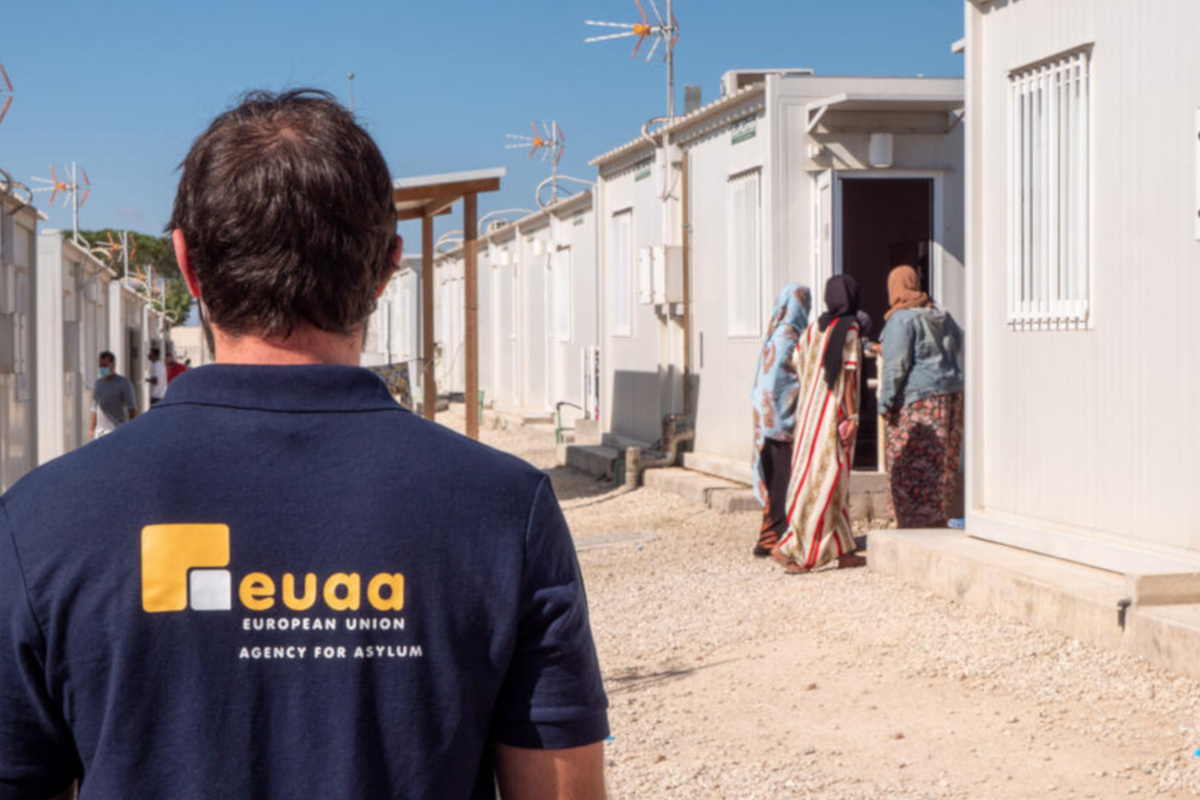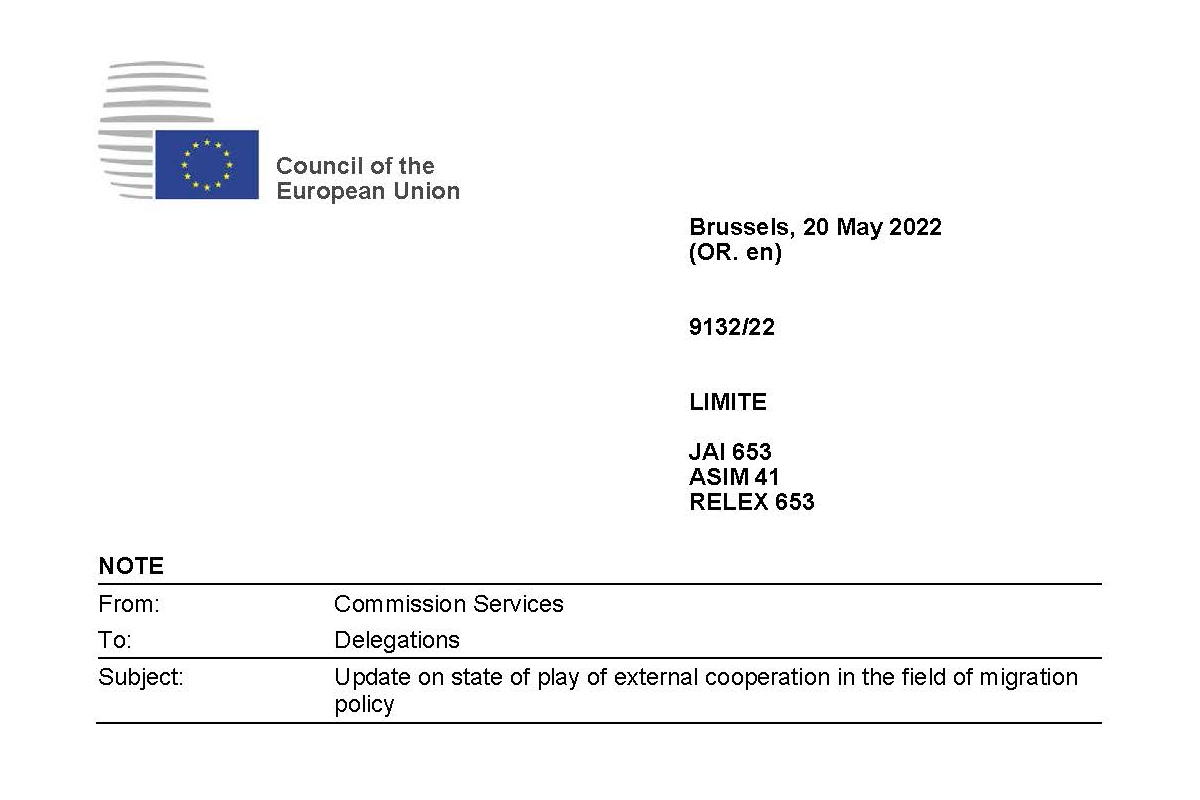EU: Attempts to increase "convergence of asylum practices" and information-sharing on "asylum applicants presenting a threat to public order"
Topic
Country/Region
24 May 2022
In an attempt to give more substantial meaning to the idea of a 'Common European Asylum System', plans are underway to encourage "the convergence of asylum practices". The French Presidency of the Council also hopes to increase information exchange on asylum applicants between national authorities, including "asylum applicants presenting a threat to public order." However, plans for a special information exchange mechanism have received a frosty reception from member states.
Support our work: become a Friend of Statewatch from as little as £1/€1 per month.

Convergence in asylum practices
A proposal from the Presidency from early April (pdf) notes that:
"In its conclusions of 26 and 27 June 2014, the European Council thus called for uniform conditions ensuring that applicants for international protection enjoy the same procedural guarantees and protection throughout the Union, through the uniform application of the acquis and the "convergence of practices"."
The question is, of course, whether practices will "converge" upwards or downwards.
The French Presidency proposes a "roadmap" through which member states involve themselves further in drawing up the EU Asylum Agency's (EUAA) guidance and information materials; use harmonised forms for replying to requests for information; better disseminate information provided by the EUAA; and "to take ownership of the European Asylum Training Programme proposed by the Agency".
The Commission should "allocate the necessary resources to the Agency to enable the list of countries of origin subject to common analysis and guidance notes to be extended."
The EUAA, meanwhile, should launch a study on practices in different member states; expand "the list of countries of origin for which joint analysis and guidance notes are prepared, where appropriate, by identifying priority countries of origin"; strengthen "professional tools and awareness-raising activities" for national courts; and "facilitate and improve the quality of information exchanges between Member States on asylum seekers, in particular between determining authorities, in particular to facilitate exchanges on the files of applicants presenting a threat to public order".
Member states were then asked:
"Do you support the orientations proposed in this document to make progress in this convergence effort?
Do you have other measures to propose?"
Information exchange
A separate series of documents concerns the issue of information exchange between national asylum authorities.
A document from February (pdf) notes:
"...exchanges of informations take place between the Dublin units, on the basis of a request for information, materialized by a form sent via the secure messaging system "Dublinet". In practice, the response time, which should be five weeks according to the Dublin III regulation, varies unequally. In addition, the content of the information sent in response also varies mainly due to the lack of a harmonized response form.
In view of these recurrent difficulties, on 14 December 2021, the network of Dublin units of the European Asylum Support Office (EASO) published a set of recommendations on information exchange for Dublin units and their national partners, aimed at promoting good practices in the field of information requests. Along these lines, the Presidency thus proposes to discuss new arrangements for the application of Article 34 of the Dublin III Regulation."
This "specific procedure... would consist of a sharing of tasks between the Dublin units and the determining authorities," namely that:
"...the Dublin units would deal with requests for information aimed at assessing the relevance of submitting a request for taking charge or taking back under the Dublin III Regulation, while the determining authorities would be responsible for responding to requests for information concerning the examination of the asylum application. "
The aim would be to "enable the determining authorities to speed up the examination of these files, if necessary, and the national authorities to anticipate or take any useful measure with regard to these applicants."
The Presidency also proposed introducing a "harmonised form for replying to a request for information, in application of Article 34 of the Dublin III Regulation".
Six weeks later, at the beginning of April, a number of national delegations - Austria, Belgium, Denmark, Estonia, Greece, Poland and Portugal - had responded to the proposals.
Their replies (pdf) included the following:
"Austria does not see the need for special operational procedures between the determining authorities"
"DK [Denmark] do not support a specific procedure for requesting information between determining authorities, in addition to the one foreseen for Dublin units..."
"We [Estonia] consider that the additional specific procedure is not needed."
"No additional procedure between determining Authorities should be created." (Greece)
"PL [Poland] does not consider a separate procedure of gathering information as necessary. The bodies responsible for exchanging information within the framework of Dublin procedure are fully aware of importance of this process and spare no effort to answer in the time limit provided by the Dublin Regulation."
"On the issue of the creation of a new specific procedure for exchanging information, we [Portugal] consider that the current procedure is adequate and functional, not seeing the need to create an additional procedure to the one currently in place for exchanging information between the Dublin units. In addition, we support the improvement of the current system."
Public order
The Presidency's February proposals also gave specific attention to the possibility of a "fast-track procedure... to facilitate the communication of information to the determining authorities and Dublin units on the files of asylum applicants presenting a threat to public order".
However, the member states that had responded by April also poured cold water on the idea:
"DK [Denmark] do not support... a specific procedure for the exchange of information regarding applicants presenting a threat to public order."
"We [Estonia] consider that the additional specific procedure is not needed. We maintain our previous position that the information on the security threat should be shared between migration authorities on yes/no basis and all other security threat related information should be shared between security authorities via their respective channels."
"Security related information exceeds the scope of art. 34. [of the Dublin Regulation] Information of that nature, often classified, is to be accessed and shared only via the competent law enforcement authorities. Administrative authorities do not have the competence to access and share security related information." (Greece)
"In our [Poland's] opinion in case of applicants presenting a threat to public order a separate procedure of gathering information is not necessary. However, the marking on the application form of the exchanging information based on art. 34 of the Dublin III that the request concerns a person presenting a threat to public order would probably cause a faster answer to the request for information. Adapting the application form to exchanging that kind of information would make it easier. Moreover, waiving of the required written consent on the part of a foreigner for the exchange of information would be reasonable as well."
The Belgian authorities, meanwhile, merely provided a description of how its determining authorities deal with security-related information and possible threats to public order.
On 7 April, two days after circulating member states' responses, the French Presidency circulated 'Terms of Reference on improving information exchange between determining authorities' (pdf).
Documentation
- NOTE from: Presidency to: Delegations: Improvement of information exchange between national asylum determining authorities (Council doc. 6331/22, LIMITE, 17 February 2022, pdf)
- NOTE from: General Secretariat of the Council to: Delegations: Improvement of information exchange between determining authorities and Dublin units: Contributions from Member States (Council doc. 7966/22, LIMITE, 5 April 2022, pdf)
- NOTE from: Presidency to: Delegations: For a roadmap for the convergence of asylum practices in the field of asylum (Council doc. 7867/22, LIMITE, 7 April 2022, pdf)
- NOTE from: Presidency to: Delegations: Terms of Reference on improving information exchange between determining authorities (Council doc. 7868/22, 7 April 2022, pdf)
Image: EUAA
Our work is only possible with your support.
Become a Friend of Statewatch from as little as £1/€1 per month.
Spotted an error? If you've spotted a problem with this page, just click once to let us know.

